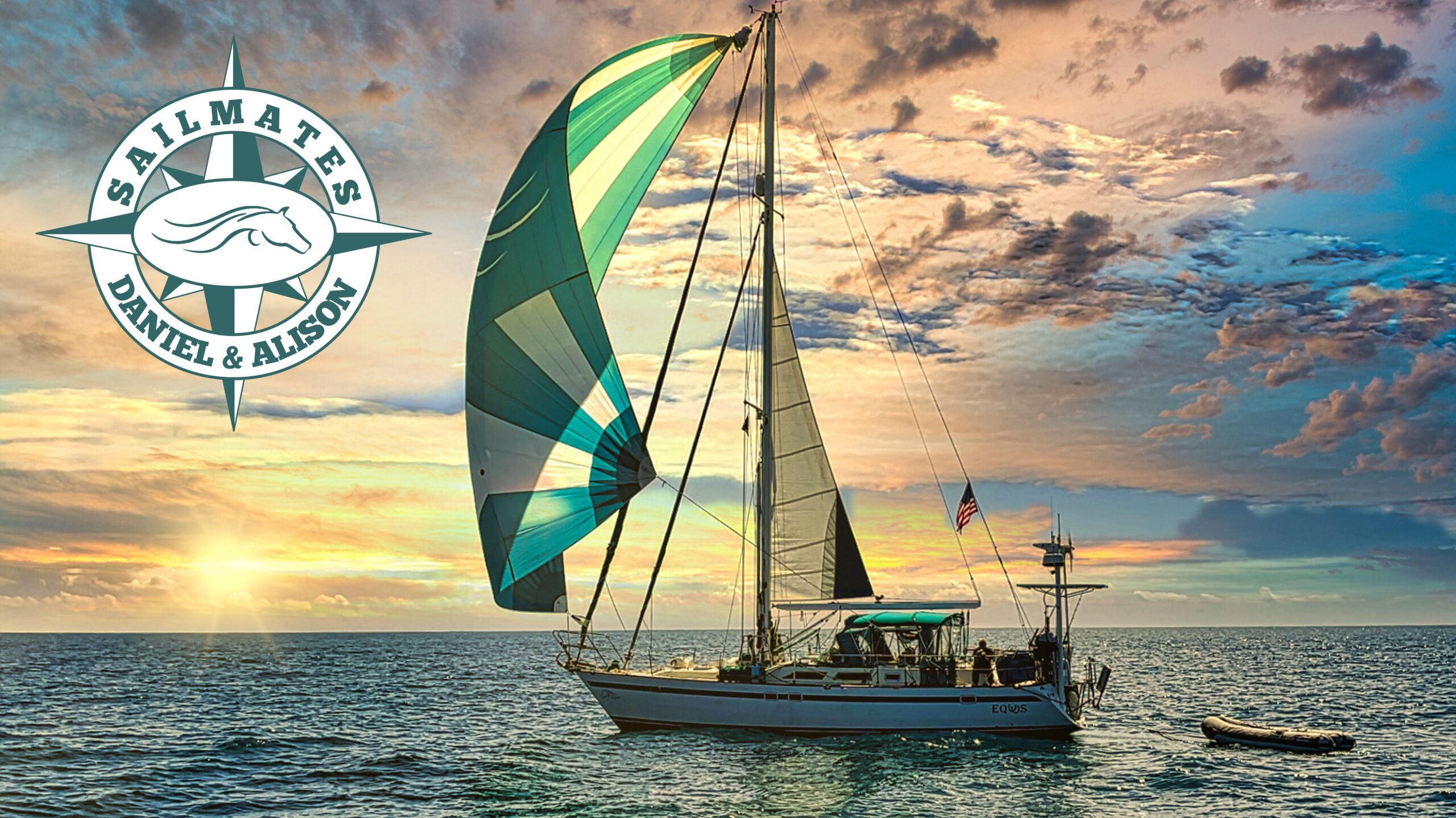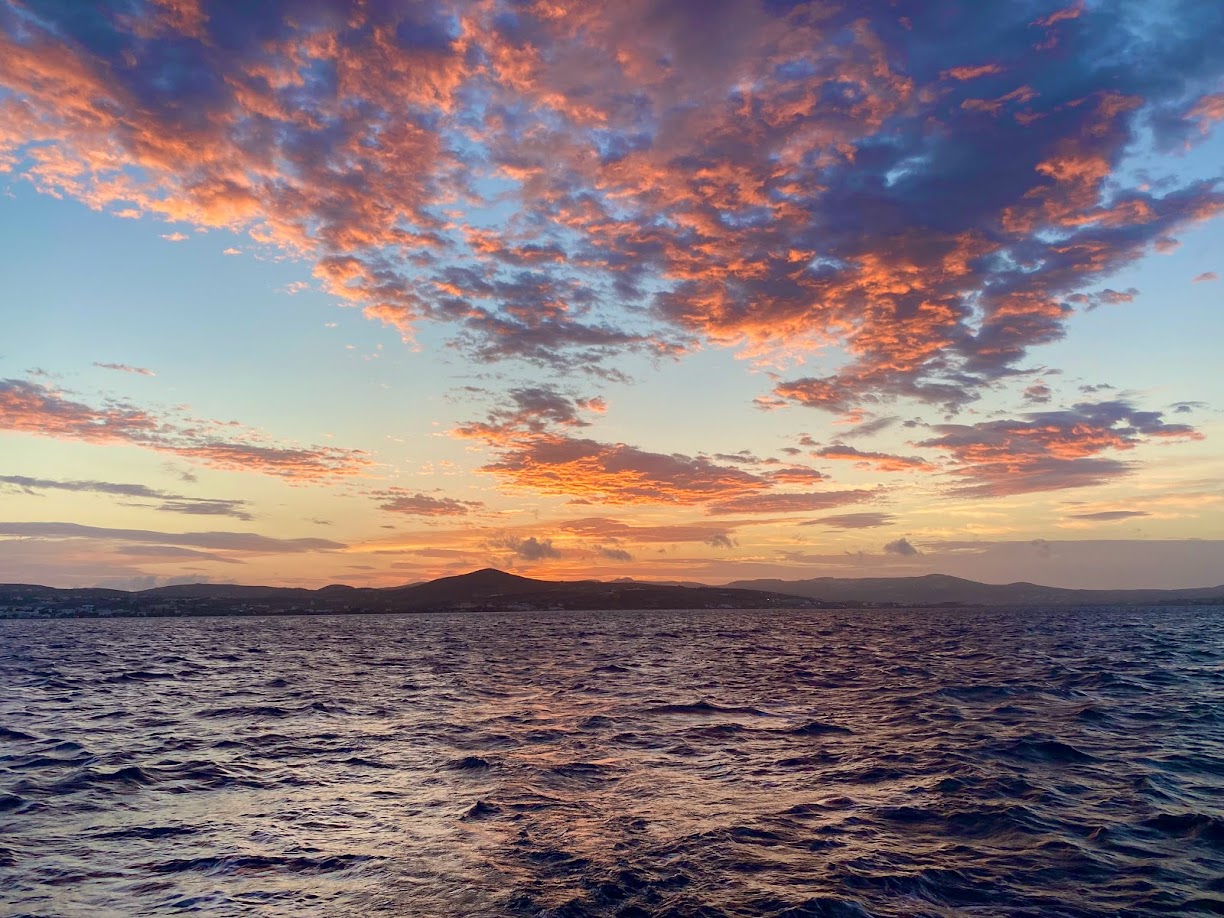“You can’t calm the storm, so stop trying. What you can do is calm yourself. The storm will pass.” – Timber Hawkeye
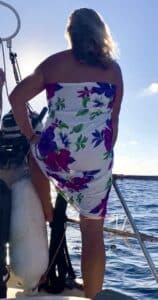
I knew that life on a boat would not be easy. Sailing is a constant mental and physical workout. I never had an “easy” life so I was okay with that. Living on a farm there was work to do 24/7. Every single day there were animals to tend to morning and night, no days off, no being lazy and sluffing it off, there was intense labor involved in feeding, caring for, and cleaning up after horses, goats, dogs, cats, chickens, and the occasional turkeys and pigs – and even a random calf. Then, there was raising a family. I had three kids to raise. As if that wasn’t enough, I had a regular job and ran a very intense, competitive equestrian program. I was no stranger to hard work.
The greatest difference between my prior life and my current life is that I always felt like I was in control. If something catastrophic or unplanned occurred, I was able to find a workaround, deal with the crisis, and everything would return to an even keel. I prided myself in my crisis management. I mistakenly thought this ability would transfer to our goal to sail around the globe. Little did I know that I was about to be dealing with a whole new ball of wax.
Sailing Crisis 101
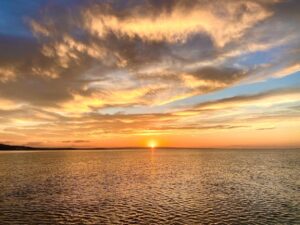
Yes, the Med is amazing to visit. The history, beauty, and culture, are all to die for. The sailing? It’s a lot of work, and we had some of the most unpleasant incidents to date on our trip. Circling back to the topic of handling adversity, let’s just say that I had some of my greatest challenges to date facing my fears. We had to persevere through some extremely difficult situations. They say what doesn’t kill you makes you stronger. I’m on the fence on this one. I have learned from each event but with each new crisis, I’m exposed to new and scary possibilities that I now have to worry about being repeated. Within the span of two months, I called PAN PAN and MAYDAY and got no response. For those not familiar with those terms, PAN PAN is a non-life threatening call for help, MAYDAY means you are in need of immediate rescue.
Crisis #1 – No Engine
In retrospect, in each of the situations, I was glad afterward that no one heard my call. The first panic attack occurred when we were sailing to Crete. We had a relatively non-eventful sail from Milos down to Crete and arrived around midnight of our second night out at sea. The full moon was glowing as we gently motored through a dwindling breeze toward the island’s harbor we chose for anchoring that night.
We only had about a mile to go when suddenly; the engine turned off. The sails were down as all we had to do was round the point and enter the harbor. Dan rushed down to the engine room, hoping for an easy fix. We’ve had clogged fuel filters that have caused the engine to stop in the past. He was hoping that was the issue. After 10 minutes, and multiple attempts to restart the engine with new filters, the engine showed no interest in being revived. The problem was, there was not a breath of wind to sail, and we were slowly drifting toward the shore, one covered with sharp, craggy rocks. If we hit them, it could be catastrophic.
Minutes ticked by. Dan futilely attempted every last-ditch effort he could think of but nothing brought the engine back to life. Finally, he grabbed the radio and hailed the coast guard. Instead of hearing, “We’re on our way!” there was only silence. He repeated his request several more times. The rocks were looming closer with the passing of each minute. Frantically, he ran back below to renew his revival efforts on our defunct engine. I kept calling the coast guard.
When I felt we were now in imminent danger of colliding with the rocks, I made the Pan Pan call on channel 16. I prayed there was someone listening to me, anyone who had a boat with an engine that could come rescue us. Again, complete silence.
When Dan popped back into the cockpit like a worn-out prairie dog, I told him, “We only have one option. We need to launch our dinghy.”
“I don’t know if can launch it in these seas!” he shouted.
“We don’t have a choice Dan,” I replied. “In a few more minutes we are going to hit those rocks!” (Look at me all thinking clearly and coming up with options to save us 😊.)
When we make crossings, we tie our dinghy to the front of the boat and our engine is secured separately on our stern. The process of launching the dinghy is difficult enough in the light. It was going to be a real challenge in the dark. We sprung into action and started untying the multiple lines that lashed it to the deck, attached the cables and halyard, hoisted it above the lifelines, then lowered it into the inky black sea. We did it in record time.
I raced back to untie the dinghy engine as Dan walked it along the side of the boat to where we could secure it to lower the engine down and into place. I lowered the 75-pound engine down to where Dan had to guide it onto the back of the dinghy. At the crucial lowering point, the swells rocked the dinghy and the engine missed. I heard Dan curse and shout. I frantically pulled it back up to prevent losing it into the sea. It took us three more attempts and was quite the struggle, but we finally managed to get the engine on the dinghy and secured.
Next came the hard part. We secured the dinghy alongside Equus and Dan started the engine, then climbed out and told me to get in. He was going to steer Equus, I had to drive the dinghy. Small problem here. I don’t drive the dinghy. Our last engine was problematic and I had some epic failures driving it. I swore off dinghy driving forever. I had totally lost my confidence. Now, Dan was asking me to rescue our boat with my dinghy driving skills. (REALLY?)
The dinghy was lashed to the stern of Equus. I just had to power the boat forward and he would use the rudder to steer. On my first attempt, it took some time to get momentum and we spun in a complete circle, getting closer to the rocks. We had room for one more attempt. I took a deep breath, said a few prayers, and we tried again. I told Dan we needed to circle one more time so he could get enough momentum and get us going straight. Thank God it worked!
We were motoring in a straight line. We only had to get a mile to where we could drop the anchor safely in a harbor. As I sat in the dinghy, watching the silhouette of Dan at the helm, guiding our boat, I noticed how warm the night air was. There was a gorgeous moon shining down, and stars lined the horizon. If you took away the nightmare that we just lived through, I couldn’t imagine a more perfect night. So, I started singing. “Every little thing is gonna be alright…”. It made me happy that we persevered, and found a new way to get ourselves out of a tight spot. I almost felt guilty that I was feeling joy during our crisis… but then I thought, naw, I’m just gonna go with it, and kept singing.
An hour later we were anchored. The next morning Dan found we had gotten some bad gas, loaded with stringy algae that had clogged our lines. He cleaned the lines, filtered our gas, and we were good to go.
Sailing Crisis #2
One of my worst fears is sinking. I think that’s a valid phobia to have considering there’s really no coming back from that one. We have a high-tech life raft strapped to the back of our boat that has food and water for 3 days and lots of emergency supplies. I pray we never, ever have to use it. Dan’s motto is “You never abandon your boat unless you are stepping off the spreaders, up into your life raft.” Considering the spreaders are at the top of the mast, you can understand that Dan will never leave his boat unless it is literally underwater.
Actually, the statistics are pretty firm on this one. Most people who abandon their boat find that the boat is still out there drifting for days even years after they are rescued. People who try to get rescued in storms often die during the rescue and their boat comes through just fine. They panic.
If the boat truly is sinking, however, that’s a different story. We had been through some pretty rough passages in the Med. One of them, we came out of a harbor thinking the seas were not too bad. We just had to round the island, then we would have a downwind passage. We came out of the harbor and the seas instantly turned ferocious. We were facing confused 10-ft. waves pounding us broadside. The boat was tossed like a toy in a bathtub. I remained calm as Dan said we were safe, we just had to round the island and head downwind. Things would calm down immediately.
It was probably the roughest hour I’ve ever experienced on our boat. At one point, Dan made me come steer as a halyard broke free on the bow. He had to go up and reattach it. I bravely took the wheel and tried to steer us into each wave to minimize the tossing and rolling. Dan miraculously grabbed the line swinging violently across the deck, and resecured it. I was proud of myself. I didn’t think about calling MAYDAY once. I felt an inner calmness I hadn’t expected from myself. Perhaps each crisis is getting me closer to acceptance and bravery? Unfortunately, that theory proved not true… but that doesn’t happen until Crisis #3.
I digress. That situation was discomfort and was probably good for me. What doesn’t kill you does make you stronger sort of thing. The next crisis came as we were attempting our passage from Tunisia, Africa to Morocco. It was supposed to take 5 days or so. We never know what the winds will do so we can only make an estimate. Our boat buddies had departed days before us for a 6-day passage. They were currently on day 9 and nowhere near Morocco.
My mindset was good for a change. I was looking forward to the passage and seeing Morocco. I had a good attitude as we set off. The weather, although pleasant at first, increased in intensity as the night rolled in. After two 3-hour watches with our autopilot acting up and I was exhausted. I headed down mid-morning to try and nap. I sniffed the air and smelled diesel gas. Never a good sign, but I thought maybe the waves had caused enough rocking that maybe fumes were in our bilge. I hesitated to mention it to Dan, but I’ve learned to never ignore a hunch when you are on a boat in the middle of the ocean. Good thing I did.
I went up to stand watch in the cockpit while Dan opened the engine compartment. I immediately heard the sound of running water, never a good thing when it’s coming from the inside of your boat. The diesel smell was coming from the funnel Dan uses when filling our fuel tank. It was being rinsed with sea water which diffused the odor. Water was flooding past through the main engine inlet cooling piping and into our bilge. We would be sinking but our bilge pump was working its little heart out to pump the water out of the engine compartment.
On top of this, were the problems with our autopilot. It kept shutting off randomly. Each time it goes off, our boat veers off course wreaking havoc with the sails. It’s a battle to get back on course and everything reset. We couldn’t relax for a minute. Considering it’s a brand-new system, installed two years ago, we weren’t happy to be having this issue. And now, our boat was flooding.
Dan identified the problem immediately. The strainer that brings seawater into the boat to cool our diesel engine had broken. Water was flowing unstemmed through the hole that is normally regulated by this basket and the sea cock. Dan had to wedge himself into the engine room and use all his strength to get the bad part out. He managed to cut himself in several places. He was a bloody mess before he finally used his superhuman strength to accomplish the impossible. He successfully removed the broken part and plugged the hole.
Our problems were not over. We couldn’t use the engine without a water supply to keep it cooled. Dan had to jury rig a new system to get water to the engine, which of course, he did. The man really is a superhero. This took him all day and he was banged up and exhausted. That’s when we decided to divert to the Italian island of Sardinia to make repairs and take a breather. It was only a day’s sail and not far out of the way.
Crisis #3
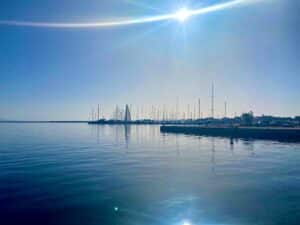
We looked again at the weather to get to Morocco for the next 4 to 5 days to get there. It didn’t look good. We decided to alter our plans and head to mainland Spain. We would look for a marina along the Spanish coast. It was only a 3-night sail. Our flight home is out of Madrid so it would be easier to get there than from Africa. It seemed prudent. We know our plans have to stay fluid when we sail – where we think we are going is often not where we land.
Unfortunately, the first night back out didn’t go well. In fact, it turned out to be the biggest nightmare of my entire voyage thus far… which is saying a lot. Up until now, it’s been weather or broken boat parts that have been problematic. The thought of losing my husband… unthinkable.
The wind was shifty and chaotic. Go figure. They were gusting in the high teens. The gusts were causing the autopilot to turn off on a regular basis. There was also no moon. The night was pitch black, the sea its chaotic self. Add some gusty winds, and well, night watch was a nightmare.
I was having trouble falling asleep and sent Dan down to the cabin. No sense in us both being awake. He was only an hour into a deep sleep when the autopilot went off and I immediately sprang to grab the wheel and steer us back on course. Tired, big waves, and being dyslexic is no excuse, but I managed to steer the boat in the wrong direction. The mainsail jibed violently to the other side of the boat with a resonating crash. The crash was followed by the shattering of our traveler. The traveler is the metal track the mainsail glides along to change from one side of the boat to the other.
I screamed in panic for Dan. When he came up, I was having a meltdown. I was shaking, crying, and basically lost my ability to do anything. We had to turn the engine on to steer the boat back through the wind. Dan got the sail back on the right side but we no longer had a working traveler. He had to force the sail over by hand. An hour later he had me calmed down and things seemed back at status quo. I made Dan sleep on the setae in the cabin instead of back in our bedroom. I wanted to be able to see him and call him up on a second’s notice. I was a bit unraveled as rough seas, autopilot failures, and lack of sleep were taking their toll. This event, unfortunately, was the precursor to the crisis, merely a hitch.
If you have been reading my blogs, you know that Dan is the crisis captain on our boat. He gives the orders and I follow them. I’m really trying to beef up my knowledge so I can be more helpful but there always seems to be a new type of crisis for which I’m not prepared. This next one was the big one. I had always told myself that if I get stuck out in stormy seas and something happens to Dan, I’m just going to go ahead and jump overboard. I would not want to try and get the boat anywhere by myself. My theory was finally put to the test.
I was on my second night watch. It was 5 AM. I was on watch until 8 AM. On Dan’s first watch, he only got half his sleep because he was up righting the jibe that previously occurred and getting me back on track physically and emotionally. Dan had been under a lot of stress and left me to go get some sleep desperately needing to recharge his batteries. He went down to sleep on the setae again – right where I could see him and call him up in an instant.
The weather had calmed down a bit, I had three hours of sleep under my belt. I was feeling a bit better.
I didn’t let my guard down and when the autopilot started beeping, I ran up to read the message. Three errors can occur. It can “lose rudder steerage”, it can “exceed rudder steerage”, or it can “lose signal to the rudder”. If it exceeds the rudder signal, you don’t have to do anything. It will find it and start steering again on its own. The other two errors shut the autopilot off. On this occasion, it was the latter. I don’t remember if I hit the button to start steering again. All I know for sure is that I started a chain of events.
About 5 minutes later, I heard the sails flapping. We were motor sailing at the time – running the engine with the sails up because the wind had died way down. Still, the sails should have been full. I checked the monitor and it seemed the boat was going in the totally wrong direction. We were way off course. I tried grabbing the helm and steering us back downwind and the wheel wouldn’t budge. I couldn’t remember if I engaged the autopilot and it was locked in a new position, or if we had lost our steerage. I was totally confused. I screamed for Dan the second time that night.
Dan rose, but I could tell he wasn’t really awake. He seemed dazed and in a fog, as he tried to grasp what was going on. I explained what had happened and I expected him to fix everything immediately. We ended up doing a complete circle. I kept yelling at him, “What is going on!”. He wouldn’t answer me so I yelled “Speak to me. Tell me what is going on.”
For the second time that night, I was close to hysteria. Dan was mumbling that something wasn’t right. He said it about three times. Then he went silent. He sat down on the bench and stared straight ahead. Then slowly, like a felled tree, he keeled over and passed out cold.
My first thought was that he had suffered a heart attack. He was dying in front of me. I shook him and screamed his name repeatedly. He was completely unresponsive. My worst nightmare was coming true. I grabbed the radio and yelled “MAYDAY”. “CAN ANYONE HERE ME? I HAVE A MEDICAL EMERGENCY, MAYDAY!” The radio was as silent as the night around us. There were no ships anywhere in the area. I was on my own.
I began to contemplate how to check his pulse and breathing, which should have been my very first response. When I put my hands on him he began to rouse. He came to but was still groggy and confused. I explained that he had passed out.
I checked our course and we were back on track. The autopilot was engaged and everything seemed to be normal. Dan was still convinced there was something wrong, the boat wasn’t steering when we did the full circle. I don’t know what happened. All I knew was that we must have our steering back because we were holding our course. I insisted that Dan drink a huge glass of water and go back to sleep. Dehydration and stress had taken their toll. I took charge and forced him to go back to sleep, worried about his health.
It turned out that I did handle the crisis correctly. The boat was just fine. I spent the next two days making sure Dan drank water excessively and take tons of naps. We arrived safely back in mainland Spain 2 days later.
Lessons Learned
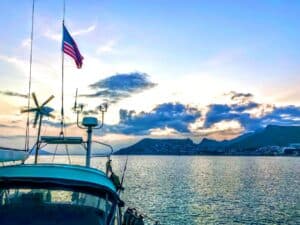
We avoided that hassle and learned a great way to rescue ourselves, if need be, with our own dinghy. Win, win.
Lesson two, renew my CPR training. Dan had one other incident many years previously when he had been sick with the flu, where he passed out cold due to fatigue and dehydration. It would have been really embarrassing if rescue had been deployed when I called MAYDAY for a non-medical emergency.
Lesson three, I have more resources than I care to admit. I make Dan shoulder everything in a crisis. It’s time I step up to the plate and pull my weight. I need to be less of a wimp and more of a first mate.
With all this water under our keel, and a marina berth in Valencia, Spain reserved, we can move forward from these eventful few months. We will spend the next two months traveling back to the US, ordering a lot of boat parts, and getting our ship in shape. We are bound for the Caribbean next. I do require a working autopilot and some other fixes before we attempt to cross. Will we get our boat in shape in time to cross this season? I have no idea. Honestly, I have no idea what tomorrow will bring, never mind our plan in three months.
We did tempt two of the conditions of our motto… we’re still alive, still in love, and still afloat. Love alone will not float this boat. We need to recharge Dan, make our boat as good as it can be, and then take it from there. We are anchored outside Valencia and will enter tomorrow. It will be a time of healing for us and our boat. We are just thankful we have made it this far.
Happy holidays everyone. The holiday season is almost upon us. I look forward to time not on a floating home and seeing my beautiful children and grandchildren and our families. God bless, and may the next few months float by smoothly for all of us.

